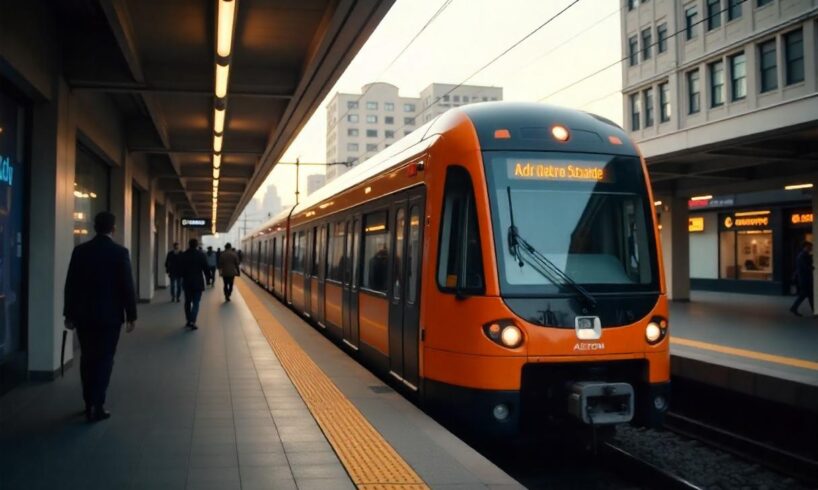
Home » Brazil Travel News » São Paulo’s Metro Line 6-Orange Set to Transform Commuting with Alstom’s New Sustainable, High-Capacity Trains
Saturday, July 12, 2025
Alstom, the global leader in the field of sustainable mobility, has now handed over the first of 22 six-car trains ordered by São Paulo’s highly-awaited Metro Line 6-Orange. Manufactured at Alstom’s state-of-the-art factory at Taubaté, São Paulo, these cutting-edge trains mark a major breakthrough in the evolution of city mobility in Latin America’s biggest city. Each train, designed to accommodate a total of 2,044 passengers, achieves speeds of 90 km/h and guarantees effective, high-capacity service to the ever-increasing need for city transit.
The Line 6-Orange, which is going to be one of the busiest and most significant transit lines in São Paulo, will carry an average of 633,000 daily passengers. The new fleet will be vital in solving the city’s transportation problems, specifically the connectivity of major institutions of learning. Nicknamed the “university line,” Line 6-Orange will directly connect a minimum of seven major universities and institutions of learning, enabling the students and lecturers to travel easily and efficiently. The route will also pass through several schools along the densely populated Avenida Paulista.
Innovative Design and Engineering of the Trains
Alstom’s Line 6-Orange trains are constructed with stainless steel, which is a light material with improved strength and energy efficiency compared to the carbon steel used for the Line 6 connector trains. By choosing stainless steel, the weight of the trains is reduced, thus decreasing energy consumption and contributing to the development of a cleaner transit system. The slim orange-hued trains reflect the color of the line’s identity, thus ensuring that they are easily identifiable and embody the line brand.
The new trains have a new-age aesthetic that centers around the passenger’s comfort and convenience. Through a thoughtful design of the interior, the new trains offer a better trip with improved seating, better HVAC, and extra-large electronic display systems that provide real-time information of the stations. Besides, the trains are durable, with a structural life of over 40 years.
Alstom Lab 4.0: Transforming Rail Engineering
One of the highlights of the design process for these trains was the use of Alstom’s Lab 4.0. Alstom’s Lab 4.0 is a state-of-the-art virtual reality laboratory which enables engineers to recreate the train environment in a highly immersive virtual space, facilitating the ability to make technical tweaks to design aspects early on. From the design of the seats to the positioning of the handrails and the safe aspects, the laboratory has facilitated a great deal of detail and fine-tuning. Virtual prototyping technology has transformed the engineering process, such that the finished product addresses the needs of both the technician and the passenger.
Enhancing Urban Mobility and Education Access
Line 6-Orange will cover 15 kilometers, with 15 stations, and will connect the northern subprefecture of Brasilândia to downtown São Paulo at São Joaquim Station. As a mega-infrastructure project, it will dramatically decrease the commute time between these two points, reducing the existing 90-minute bus trip to a 23-minute train trip. With the high-capacity trains, commuters will have the ability to travel safely and efficiently, as well as have greater access to the academic centers along the route.
A 2022 report prepared by the São Paulo State Government pointed out that over 40% of the ridership of Line 6 are projected to be university students, 18 to 24 years old. This age group is likely to benefit the most from the new link of the line to the major universities, which aims to foster wider access to higher education as well as youth opportunities in the area.
A Key Infrastructure Initiative for Latin America
São Paulo Metro Line 6-Orange is simultaneously one of the city’s largest transportation projects and the largest current infrastructure project in all of Latin America. The project is underway as a public-private partnership (PPP) between the State Government of São Paulo and Concessionaire Linha Universidade, with the prime construction work being performed by ACCIONA. When finished, the line, as part of the 19-year concession contract, will produce more than 10,000 permanent construction-related jobs. Alstom’s contribution to this transformative project is a testament to the company’s commitment to sustainable and innovative mobility solutions that address both environmental and societal needs. The line will not only improve the efficiency of urban mobility in São Paulo but also contribute to the city’s economic development by providing better access to education and employment opportunities.
Manufacturing Excellence at Alstom Taubaté
Alstom’s Taubaté factory has emerged as a center of expertise for the manufacturing of stainless steel carriages. Commissioned in 2015, the factory has already delivered over 170 trains to cities globally, such as São Paulo, Santiago, Taipei, and Bucharest. Strategically located near the major corridors of transportation as well as the Port of Santos, the biggest port of Latin America, the factory ensures easy logistics and prompt delivery.
It has demonstrated its capability and versatility by delivering crucial infrastructure work with tight timetables. Moreover, the plant was required to deliver 27 Citadis trams for the Light Rail Transit (LRT) system of Rio de Janeiro, completing the project with a compressed timetable to meet the requirements of the 2016 Summer Olympics. Additionally, it has delivered NS16 cars for the Santiago Metro and other significant rolling stock projects abroad.
Alstom announced a broad strategic extension in 2022 to expand its Taubaté factory with a R\$100m investment. Resulting from the securing of several national and global contracts, the extension reflects Alstom’s effort in shaping urban mobility solutions across Brazil and Latin America. It further strengthens the Company’s global manufacturing base, enabling it better to meet the growing need for new transportation technology.
Alstom’s Long History in Brazil Since 1955, Alstom has been a key player in Brazil, playing an instrumental role in advancing the nation’s infrastructure and mobility sectors over the years. As a leader in rail mobility, the company has played a crucial role in enhancing the safety and efficiency of Brazil’s rail system. Alstom also leads the installation of signaling systems in the country, with over 6,000 kilometers of lines equipped with advanced signaling technology. These systems are vital to ensuring the safe and reliable operation of trains across Brazil and beyond.





